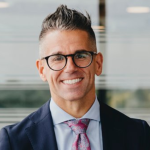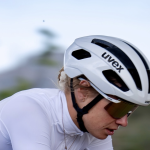Dennis Madsen, REIs president and CEO, first joined the national retail cooperative in 1950 as a 17 year old. He started with REI on the retail sales floor and the mail order department.
In his 38-year career with REI, Madsen has held several leadership positions, including 13 years as the companys EVP & COO, as the Seattle-based company has grown from one store and a catalog to 69 stores, REI.com, REI-OUTLET.com and REI Adventures, an adventure travel company.
Madsen serves on the national board of directors of the Rails-to-Trails Conservancy. He also serves on the boards of the Alaska Air Group, parent company of Alaska and Horizon airlines; Washington Wildlife and Recreation Coalition; IslandWood; Bicycle Alliance of Washington; and the Western Washington University Foundation for which he serves as president.
BOSS: Talk about your involvement with Rails-to-Trails and the other cycling organizations that you belong to. What spurred your activism in this area, and what are some of the benefits these organizations provide?
DM: My firm belief is that we all need to give back to the community, as both organizations and individuals. To me personally, its about giving back because its the right thing to do philosophically you cannot be effective in life unless you are passionate, and as my career progressed I became more and more involved with these national organizations, like Rails-to-Trails.
Ive been involved with Rails-to-Trails for, well, over a decade and just recently have been appointed to the board.
Rails-to-Trails is important because it offers a unique opportunity at outdoor recreation in an urban setting.
I have always been an avid cyclist, both for recreation and commuting to work. I have been a member of the Bicycle Alliance of Washington, which is involved in education and developing bicycle infrastructure. I am also involved with the Earth Corps. Of Washington – which focuses on environmental stewardship and land restoration – and I am involved with the Islandwood Environmental Learning Center.
On a corporate level we try to align our funding with the interests of our employees. It is my experience that when you combine funding with heart and soul, you get more than the sum of the parts. This year we will have set aside $2 million for different non-profit organizations. The key is to find what you are passionate about and you begin from there.
BOSS: I understand that REI has played a key role in the Outdoor Industry Foundation and their research. What was the companys involvement in the, “Exploring the Active Lifestyles” report.
DM: Directly, we contributed dollars to the Foundation. We werent the only contributor, but we were a major contributor. Mainly it was our Senior Vice President of Merchandising, Matt Hyde it was because of his involvement and support that the research happened.
BOSS: What were some of the key points that jumped out at you from the “Active lifestyles” study?
DM: The study really raised the awareness of opportunities that the outdoor industry has in the population as a whole. A key opportunity is the fact that teenagers find their favorite activity and continue that activity throughout their entire life this tells me we need to do everything we can to encourage the youth to participate in human powered outdoor recreation.
The study also raises some questions. Many people walk away from outdoor activities, at least for a time, in their mid to late twenties. We knew this intuitively, but now we know it for a fact, and we need to figure out how to stay connected with these participants.
I am very encouraged that outdoor participation is embraced by the vast majority of the U.S. population today. The market is much bigger that we once thought. The real challenge is overcoming the barriers of time and cost, and these barriers are all manageable.
BOSS: We spoke with Frank Hugelmeyer last month (see BOSS_0408), and he said that the OIAs goal is to double the size of the outdoor industry by 2015. How feasible is this and what is REI doing to meet the goal?
DM: I dont think that its an unreasonable goal. Is it going to be easy? No We need to capture a share of the public that is not currently involved in outdoor recreation. We as a company can see ourselves easily doubling in size in that time period. To help the industry as a whole, we will be making REI more accessible, and we will be supporting clubs and organizations that engage kids in outdoor activity.
BOSS: We know you have some pretty big growth plans, could you outline some of these for us?
DM: If you look back at the history of REI for the four decades Ive been with the company, you can project the growth plans from there. We started as a small store, and then distributed a catalog as our members moved farther away and still wanted access to the products. Now we have multiple stores across the country and we are seeing a need to in fill certain key markets.
With congestion being what it is, people are no longer willing to drive 20-30 minutes to shop… We opened seven stores last year and plan for six this year. Six to eight stores per year is our target to provide healthy growth. We really try to hit that sweet spot with our growth. If a company grows too fast it is difficult to hold the culture together and it crumbles. If it grows too slow, it stagnates. I can look at our industry and point out key players that have made both mistakes.
BOSS: What are some of the key categories and brands that are showing the most growth?
DM: Cycling is growing faster than any other category right now. Womens merchandise is growing dramatically faster than mens. Another category is what we call OXT Outdoor Cross Training, and this is basically taking underwear to places its never been Yoga is also very big right now; it is an activity that resonates very well with our core customers.
As far as brands go, prAna, out of California, saw this Yoga trend developing and acted. They were traditionally known as a climbing brand, but recognized the synergies and have done very well for us.
This year online sales as a percentage of total sales have grown at a record pace Direct sales are currently in the high teens as a percentage of sales. However, I think we can safely dispel the myth that the internet is going to put all retailers out of business. Customers are still seeking the shopping experience the feel of that tent, sleeping bag, boot or pack.
BOSS: What are we going to see out of REI in the next year?
DM: We will continue to focus on four main areas. We will in-fill new stores in key areas. We will continue to integrate our web technology bringing direct sales and in-store sales closer together. You will see new product from REI Gear, and you will see a continued investment in the community.















